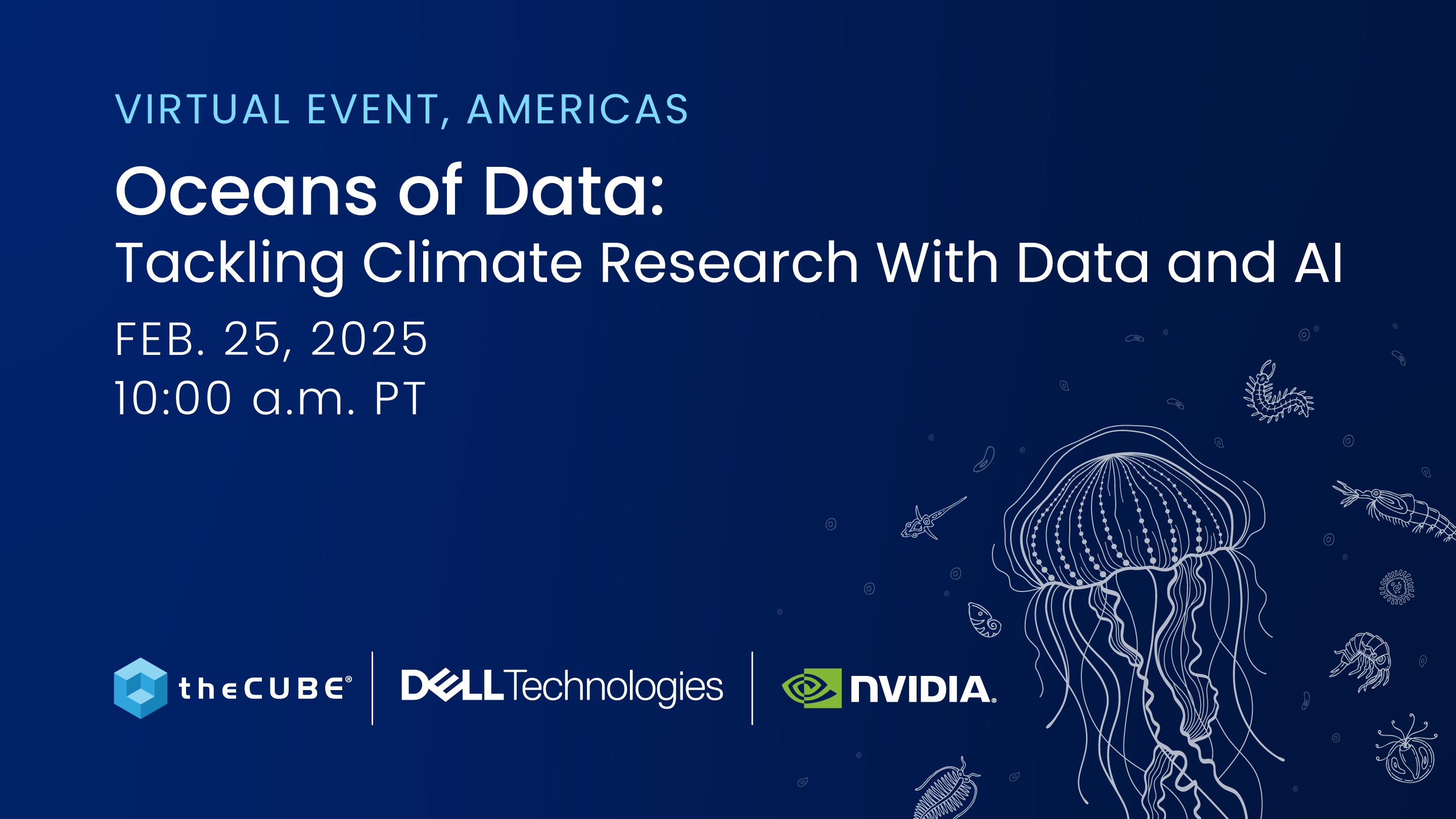Data-driven climate research at leading universities is generally focused on a quest to solve big challenges in the world. Some of these include understanding our global environment, improving health, fostering better use of natural resources, and developing new bio-based products and energy sources.
At Oregon State University, a focus on climate research has led the school to develop a robust data foundation with Dell PowerScale for driving impactful results. This involves a reliance on high-performance computing, or HPC, provided by Dell Technologies Inc. and its partners to provide the computational power necessary for evaluating complex outcomes. In today’s world, that also means providing a structure that can support AI.
“Oregon State University is a wonderful example of harnessing the power of AI to integrate everything from satellite imagery to on-the-ground sensor data,” said theCUBE analyst Dave Vellante. “This convergence is revealing hidden insights about our oceans and our planet, and it’s fundamentally transforming the world’s approach to earth science.”
During the “Oceans of Data: Tackling Climate Research With Data and AI” event on February 25, theCUBE, News Media’s livestreaming studio, will examine how Oregon State University’s data foundation is maximizing AI’s potential in climate research. Don’t miss the Asia-Pacific broadcast on February 26. Dell experts, along with Chris Sullivan from Oregon State University, will delve into managing large data volumes, integrating AI solutions and handling unstructured storage. Learn how Dell PowerScale and Nvidia Corp. infrastructure support scalable AI adoption, offering actionable strategies to optimize data management, accelerate AI workflows, and future-proof AI initiatives across diverse applications, driving critical results in climate research and beyond. (* Disclosure below.)
Sophisticated tools for climate research
The field of climate research has evolved far beyond the days when temperature gauges and weathervanes were the primary sources of scientific information. Climate scientists today rely on a sophisticated infrastructure of earth-orbiting satellites, the International Space Station, and an extensive network of airplanes, ships and buoys to provide information for tracking climatic shifts.
Researchers at Oregon State University have pursued projects designed to develop new sources of renewable energy and technologies with minimal climate impact. An example of this can be seen in a federal grant the school received in December to develop and test marine energy devices. The focus will be on building the next generation of offshore wave technologies and environmental monitoring to further the cause of renewable energy development.
Researchers at the school have also developed a material that has shown an ability to convert sunlight and water into clean energy. The solution is a photocatalyst which can change the rate of a chemical reaction, creating new opportunities for hydrogen fuel production and manufacturing processes that are less harmful to the climate.
Projects such as these underscore the importance of an AI-focused computing infrastructure that can support the massive amount of data required to support climate-based research.
“What truly excites me is seeing institutions like Oregon State University harness the power of AI alongside robust AI-optimized infrastructure from firms like Dell,” Vellante noted. “This combination is enabling researchers to decode intricate environmental systems, turning enormous volumes of raw data into actionable intelligence that guides both decision-making and breakthrough scientific advancements.”
Deploying adaptable hardware architecture
Scientific advancements at schools such as Oregon State University are being made possible through the use of flexible and adaptable hardware architecture, such as Nvidia’s GPUs along with Dell’s PowerEdge servers and PowerScale storage. Researchers are able to tailor Dell’s systems for diverse workloads, involving data processing and simulations that can identify potential climate-based solutions from a massive amount of information.
Oregon State University has also advanced its AI capabilities through a collaboration with one of Dell’s key AI development partners, Nvidia. The chipmaker’s chief executive, Jensen Huang, is an alumnus of the school. The university recently broke ground on a research complex that will house one of the nation’s most powerful Nvidia supercomputers.
The complex will enhance Oregon State’s contributions to semiconductor research, high-performance computing and AI-driven problem-solving across various fields. The goal is to bring together faculty and students to solve critical challenges in areas such as climate science, clean energy and water resources. The new center at the University provides yet another example of how AI is transforming the climate research field.
“From my perspective at theCUBE Research, the convergence of AI and massive, complex datasets is a game-changer for understanding our oceans and the Earth,” Vellante said. “With data spanning from satellite imagery to precise in-situ sensor measurements, AI is not just enhancing scientific research—it’s fundamentally transforming how we uncover hidden insights and drive innovation in earth sciences.”
TheCUBE event livestream
Don’t miss theCUBE’s coverage of the “Oceans of Data: Tackling Climate Research With Data and AI” event on Feb. 25. The Asia-Pacific broadcast will air on Feb. 26. Plus, you can watch theCUBE’s event coverage on-demand after the live event.
How to watch theCUBE interviews
We offer you various ways to watch theCUBE’s coverage of the “Oceans of Data: Tackling Climate Research With Data and AI” event, including theCUBE’s dedicated website and YouTube channel. You can also get all the coverage from this year’s events on News.
TheCUBE Insights podcast
News also has podcasts available of archived interview sessions, available on iTunes, Stitcher and Spotify, which you can enjoy while on the go.
News also has analyst deep dives in our Breaking Analysis podcast, available on iTunes, Stitcher and Spotify.
Guests
During the “Oceans of Data: Tackling Climate Research With Data and AI” event, theCUBE analysts will explore how a strong data foundation is key to unlocking AI’s potential in climate research. Dell experts and Oregon State University’s Chris Sullivan discuss managing large data volumes, integrating AI solutions and scaling with Dell PowerScale and Nvidia infrastructure.
(* Disclosure: TheCUBE is a paid media partner for the “Dell Oceans of Data: Tackling Climate Research With Data and AI” event. Neither Dell Technologies Inc., the sponsor of theCUBE’s event coverage, nor other sponsors have editorial control over content on theCUBE or News.)
Image: News
Your vote of support is important to us and it helps us keep the content FREE.
One click below supports our mission to provide free, deep, and relevant content.
Join our community on YouTube
Join the community that includes more than 15,000 #CubeAlumni experts, including Amazon.com CEO Andy Jassy, Dell Technologies founder and CEO Michael Dell, Intel CEO Pat Gelsinger, and many more luminaries and experts.
THANK YOU









